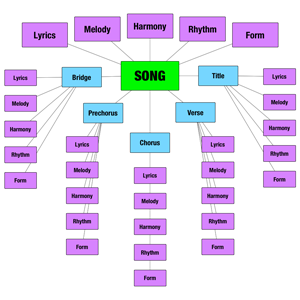-
(Difference between revisions)
Line 44: Line 44: King of Pain - The PoliceKing of Pain - The Police- ==== x a x a ====+ ==== [[:category:x a x a|x a x a]] ====Every Little Thing She Does Is Magic - The PoliceEvery Little Thing She Does Is Magic - The PoliceLine 54: Line 54: Owner of a Lonely Heart - YesOwner of a Lonely Heart - Yes- ==== a a b b ====+ ==== [[:category:a a b b|a a b b]] ====My Generation - The WhoMy Generation - The WhoRevision as of 18:17, 24 November 2010
Contents
Form
Songwriting Infobox 
Song ModelSongwriting Lyrics - Melody - Harmony - Rhythm - Form Song Form Title - Chorus - Verse - Prechorus - Bridge Rhythm Infobox Rhythm Lyric - Melody - Harmony - Rhythm - Form Relative Beat Strength The Chorus
The chorus is the part of the song that keeps coming back. This part of the song usually includes the song title and summarizes the main idea of the lyric. It is also usually the emotional high point—the most intense part of the lyric.
Why is it called a "chorus?" Because the audience is supposed to sing along. So, that's your goal: to get your audience to sing along with your song's chorus.
The Verse
The verse is a recurring song section and is generally the first section of the song that the listener hears. Each time the verse repeats, the melody stays the same but the lyrics generally change. The verse is more like a narrative which tells the story.
Effective verses should connect to the chorus, build up intensity into the chorus, and strongly contrast the chorus.
- Tip
- Present the song's story from the singer's point of view. This solves any problems with verb tense, setting, literary point of view, gender, and so on.
- Tip
- Setting your verse's melody and lyrics to short notes is more conversational than longer notes. This will help draw your audience into the story. The chorus can then be made of longer notes, where you emphasize just a phrase or two to make it contrast the verse and give your listeners the opportunity to think about the lyrics.
Common Verse Types
a b a b
Fire and Rain - J. Taylor
I Shall Be Released - B. Dylan
She Loves You - The Beatles
I Want to Hold Your Hand - The Beatles
Back in the Saddle - Aerosmith
a a a a
Roxanne - The Police
Feelin' Alright - J. Cocker
King of Pain - The Police
x a x a
Every Little Thing She Does Is Magic - The Police
New Kid In Town - The Eagles
Born To Be Wild - Steppenwolf
Owner of a Lonely Heart - Yes
a a b b
My Generation - The Who
My Life - The Beatles
Message In A Bottle - The Police
Magic Carpet Ride - Steppenwolf
The Prechorus
The prechorus is sometimes called a transitional bridge, climb, ramp, or by other names. A good prechorus contrasts with both the verse and the chorus and it creates momentum towards the chorus. The idea is to create more activity or change the balance of the song. The prechorus should leave the listener unsatisified, wanting to hear more and then resolving into the chorus.
- Tip
- You can build contrast with rhythm (note lengths, phrase lengths, space, and number of phrases), pitch (notes, melodic shapes), and developmental structure (rhyme scheme, motif development).
Man in the Mirror - M. Jackson
If This Is It - H. Lewis
Billie Jean - M. Jackson
I Want To Know What Love Is - Foreigner
The Bridge
The bridge usually comes between two choruses at the end of a song. The rule of thumb for a bridge is this: whatever your verses are doing, the bridge shouldn't do. For example, If the verses are telling a story, the bridge shouldn't continue the story line, but rather, comment on it, or take a new angle on it. The bridge can be general if the verses are specific and vice versa. The bridge can be the character's internal reaction to the events described by the verses. If the verses are about the character's internal life, the bridge could show an objective point of view.
I'm With You - A. Lavigne
Don't Speak - No Doubt
Sometimes When We Touch - D. Hill
Verse/Refrain
The verse/refrain song has the refrain (or title) in the verse. It's usually placed in the first or last line. In this form, there are two things to consider: how to build intensity as you approach the title, and how to set the title effectively.
Blowin' in the Wind - B. Dylan
Sounds of Silence - Simon and Garfunkle
Help Me Make it Through the Night - K. Kristofferson
Nothing Compares to You - Prince
-
Meta
